- Home
- Darrell Maloney
Frozen (Final Dawn Book 10) Page 4
Frozen (Final Dawn Book 10) Read online
Page 4
The general mood, if it could be summed up in one word, was “relief.” All the town’s residents had heard the rumors that another meteorite might be coming. All of them knew, although it was supposed to be a closely guarded secret, that Marty and a group of helpers was preparing the old prison for use as a shelter.
And to a soul, all were hoping and praying it would be finished in time.
As they entered the place, they seemed assured that it was.
“Everyone, please have a seat and let me welcome you to your new home for the next four years or so. I trust you’ll find the going a lot easier this time than last. I’ve been advised by Bud Hance, our city auditor, that we’ve got enough food and water to survive the freeze and then some.
“It’s time to put your worries to rest and to relax a bit.
“Kelton, come up here a minute.”
A young man with a ponytail sticking out from beneath a red bandana stepped forward and joined the mayor at the end of the room.
“Most of you know young Kelton. He grew up here in Eden and is one of the most talented artists I know. He’s responsible for painting the game boards on the tables in front of you. The game boards are just one of the things we tried to do to help you pass your time. The tables didn’t have drawers when this was a prison. One of our workers fashioned drawers in the prison metal shop and attached them beneath each tabletop. If you’ll reach beneath the table, you’ll find the drawers. They hold the pieces you’ll need for activities at that particular table. Monopoly pieces for the Monopoly table, Scrabble pieces for the Scrabble table, etcetera. I’d like to ask everyone to give Kelton a big round of applause for his efforts.
The group dutifully clapped and cheered.
“Two more things I want to say about Kelton and his work before I let him sit down. He, like everybody else, will have a lot of free time on his hands in coming months. I’ve asked him to paint murals of the city of Eden on all the walls in the block to make the place feel a little more like home.
“Also, Kelton has been kind enough to paint two identical signs. Tomorrow he will hang one sign on each side of the existing sign in front of this place. Instead of saying “Eden Federal Correctional Facility” it will now be known as “Eden South.” We chose that name because… well, it’s on the south side of town. And it for damn sure is no longer a prison.
“It’s now a sanctuary.
“Before I call Marty up to share the ground rules with you, there are two more people I want to thank. Tom Tuttle and Charlie Shute, stand up, will you?
“These are the two guys responsible for making this place look less like a prison and more like a college dormitory. You can thank them for having locking doors on your cubicles. That’s what they are now, not cells. Anybody who calls their cubicle a cell in my presence will get to be my guinea pig when I test the old electric chair to see if it still works.”
A couple of the more gullible people in the audience looked a bit worried.
“I’m just kidding, Martha. You too, Stan. This place has never had an electric chair. Now I guess it never will. For that matter, let’s not call this a prison anymore either. Let’s just refer to it as Eden South from now on, okay?”
Mayor Al began to blubber a bit, and it became obvious to those who hadn’t already known that he’d been nipping at the bottle again.
Mayor Al had taken office after the first freeze, not before. He was never elected, but rather was drafted in the same manner Marty was offered the position as police chief.
He got the job because he was generally well liked around town and because nobody else wanted a job leading a citizenry which was mostly dead.
Before he was mayor, Al was the owner and proprietor of one of the two liquor stores in town. And he had the foresight to hide a good amount of his stock as the world began to freeze over.
He hid enough of it well enough so that when everyone else in town ran out of the stuff he was still showing up roaring drunk occasionally.
Marty didn’t know of Al’s background until the good mayor came to him a bit tipsy one day and decided it was time to confess.
Still, all agreed he was a pretty good mayor. Better than average, most felt.
Marty told him thanks for apologizing that day, but that it didn’t matter how he got the job. He told Al it was apparent he had heart and a genuine compassion for his people. And that, in Marty’s mind, were things most politicians were lacking.
“We’re a couple of misfits, mayor,” Marty had told him. “But it is what it is. We’ve still got jobs to do and maybe by working together we can help these people survive the second freeze intact.”
They’d made a pact that day, the two of them. They were to strive to save every last resident, both from marauders and from suicide.
“Okay, I’ve jabbered long enough. If any of you have any questions, you can find me easy enough because… well, ‘cause none of us are going anywhere anytime soon.”
He started to take a seat when someone in the back started a chorus of For He’s a Jolly Good Fellow. By the last line of the ditty everyone had joined in.
The mayor was moved to tears and tried to hide his face, but failed miserably.
They knew it was the mayor, with Marty’s help, who’d saved them all from almost certain death.
Marty smiled. Actually, most of it was his doing. But he wasn’t one to take credit. He actually hated the limelight. And he didn’t want to be viewed as a hero.
He’d just keep on being Marty.
-10-
Marty took his turn on center stage.
“I think all of you know me by now. If you don’t, my name is Marty. I’m the town’s reluctant police chief. Mayor Al asked me to give you guys the nuts and bolts of how the operation is going to work.
“Al had a couple of his people assign the cubicles based on your neighborhoods and known friends. Also, those of you with children might want them to be as far away from you as possible, but no such luck. They’ll be next door to you.
“If any of you want to change to a different cubicle, just find someone willing to swap with you and change the nameplates on your doors. Also, we’ve accumulated a pretty good supply of home décor items and placed them in the main supply room if any of you want to personalize your living space.
“The main storage room is room B-1 over my left shoulder. That’s where you can get things like toilet paper, soap and shampoo and shelf-stable food items. One of our volunteers has agreed to keep it stocked. Ray, stand up, will you?
“Ray has set up the room similar to a convenience store. Therefore, we’re going to call the room ‘Seven-Eleven.’ There are over three hundred line items on the shelves in there, but only one or two of each line item. We’re asking you all to take only what you need. Don’t try to hoard supplies. It’s not neighborly and will gain you some enemies.
“Ray will go through the room after it closes each day at five p.m. and will replace what’s missing from the bulk stock in the other cell blocks. By the time he opens the room back up at nine a.m. the next day, it’ll be fully stocked again. So if somebody beats you to the two tubes of toothpaste, don’t freak out. Just come back the next day.
“Do you have anything to add, Ray?”
“Yes. If there’s something you want or need that isn’t in the Seven-Eleven, tell me what it is. I’ll see if I can find it for you in our bulk storage areas. But please be patient with me. It may not be in there, and if it is it may take me awhile to find it.”
“Thank you, Ray. Let me add this: If you want something and we don’t have it, don’t take your wrath out on Ray. It’s not his fault. We couldn’t collect everything. He’s not being paid to do this; he’s doing it because he’s a nice guy.”
“Gee thanks, Marty. I love you too.”
“Shut up, Ray.”
But he said it with a smile.
“Okay, next item is the food. The food stocked in the Seven-Eleven is all microwavable except for the dried beans and pasta. In Room B-2 we have a bank of microwaves, a prep counter and a dual sink. You can make all your meals in there. Please be courteous of others and don’t rush them. If the room is crowded come back a little later. Everyone doesn’t have to eat their meals at exactly the same time. And please clean up after yourselves. Your mama doesn’t live here. You have to pick up after yourself.
“Back to the water. There are cases of drinking water dispersed all over the place, in every little nook and cranny we could find.
“Please don’t use it.
“I know, it’s not fair of us to put it there and tease you, but that’s not our primary source of water. It’s our backup.
“One of the things it’s impossible to gauge is how much water we can pump out of our well before the well runs dry.
“Hopefully there’s enough water there to provide our needs for a hundred years or more.
“But Mother Nature hasn’t exactly been very kind to us lately. I don’t think she has a vendetta against us, necessarily, but I think she’s an evil wench who doesn’t like us much.
“So just in case the well runs dry before the thaw comes, or the well pumps break and cannot be repaired, we need to save the bottled water.
“For the same reasons, we’re asking everyone to help us in our efforts to conserve water. Each of your cells…”
He looked in Mayor Al’s general direction.
“Sorry. In each of your cubicles is a small lavatory you can use to clean yourselves on most days. We ask that you only take a shower every third day to help conserve water.
“Unfortunately, it would have been impossible to add individual showers to each of the cubicles. Instead we took the two existing group showers and designated one for men and one for women. Since most of us are past our physical prime, we don’t want to hurt anybody’s eyes or sensitivities by letting them see our naked bodies running from our cubicles to the showers and back again. So please, for everybody’s sake, cover up.
“If you didn’t bring a bathrobe, not to worry. Ray tells me he has several sizes of men’s and women’s robes in the Seven-Eleven.”
A voice yelled from the back of the room, “Any chance we can give a little on that policy and get a shower every other day? I mean, having all these dirty bodies within close proximity of each other…”
Marty started to speak, but Mayor Al spoke over him.
“Hank, believe me, nobody wants to smell your dirty body less than me. But our water supply is something we just can’t mess around with. Maybe after the snow accumulates to the point where it’s several feet high outside, we can use that as an emergency water source should the well dry up. Maybe then we can loosen the water restrictions a bit. But for now it’s just not prudent.”
Hank grumbled something the mayor couldn’t hear, but he let it pass.
“And let’s be honest, Hank. During the first freeze, the municipal water station went down after two weeks. Nobody had any showers at all for six and a half long years. So you have to agree that a shower every third day is a big step up.”
Several heads nodded. The mayor had a point.
It was obvious the mayor’s operation wasn’t going to be a government of group participation, as they’d decided to do at Salt Mountain.
Al intended to run his operation with a single man in control.
And he wanted the residents to understand from the beginning that he was that single man.
-11-
Back at Salt Mountain, eight days into the freeze, things were running more or less smoothly.
There still hadn’t been any precipitation. The air was a crispy twenty four degrees, the wind chill probably ten degrees less than that. But the roads were clear and the drivers were getting used to driving in the dark.
There was one glitch. They found that after ten years, the halogen headlights in the big tractors were burning out at an alarming rate. Every few days a bulb would suddenly start to dim and would go from full power to nothing in a matter of minutes.
Rusty, who was as close to a professional mechanic as anyone in the group, ventured a guess why.
“I think the prolonged period of below-zero temperatures during the first freeze weakened the glass. For years they were as cold as my ex-girlfriend’s heart. Now all of a sudden we’re putting an electrical charge onto the gas inside the bulb and the glass is suddenly getting hot again. The glass is eventually getting microscopic cracks in it, and is letting the gas slowly escape. That’s why it dims gradually over a matter of minutes instead of going out all at once.”
Frank was impressed and said so.
“That makes sense, Rusty. Good job.”
“Either that, Frank, or there’s tiny gremlins who live under the hood and they sneak out occasionally and punch out the headlights with invisible little sledge hammers.”
“Never mind about the ‘good job’, Rusty. You’re an idiot.”
The workaround was easy. Since Lenny had left the Trucker’s Paradise truck stop to go into the Eden prison with Marty and the others, the truck stop was now abandoned.
But its shelves were still stocked.
Brad simply swung by the truck stop on one of his runs and cleaned out all the halogen bulbs they had.
All the drivers now carried half a dozen in their cabs with them. Every time one went out they merely stopped their rigs and replaced them. It was a five minute job, once or twice a week. But it was doable.
Problem solved.
Of course, it was still cold. But long haul tractors tended to have great heating systems and they were comfortable as long as the drivers were in their cabs.
It was when they were in the elements they hated their jobs and cursed the heavens. For that was when they were most miserable.
The trailers they gathered had been sitting idle for a very long time. More than ten years. Many of their tires were flat. Many of their compressed air lines were brittle and cracked and would no longer hold air. Without air the brakes wouldn’t release.
Even before Cupid 23 struck the earth, the drivers had to perform some kind of maintenance on roughly forty percent of the trailers before they could latch on and drag them to the mine. That hadn’t changed.
What had changed was that all those tasks were much harder to perform in temperatures which ranged from ten to twenty degrees Fahrenheit.
The tire Bryan used to change in twenty minutes now took forty. Air line changes took twice as long as well. In addition, now that they were driving in the dark they were hooking up electrical pigtails to the trailers to light up trailer lights they never worried about before.
And many of them didn’t work anymore.
The drivers were spending less time in their cabs, speeding up and down the highways, and more time on a knee on icy cold asphalt fixing things.
They’d gone from averaging twelve loads a day before the freeze to eight loads after.
Still, they were still moving provisions. Still adding food, medications, and other essentials to their stockpiles. Still finding an occasional fuel truck containing diesel, that they could drag back to increase their fuel stores.
And still using the same radio frequency they’d always used.
Marty had used the same frequency when he was running his own gathering operation.
It only made sense. By using the same frequency the two groups could warn one another of a looming threat. Share weather information. Call twice as many people for help if there was an accident or a breakdown.
Now Marty was off the road for awhile.
And he sort of missed it.
He sat at the guard unit in the corner of the cellblock’s common area. The unit was elevated from the floor several inches, and was surrounded by Plexiglas. But it offered no protection for the guards during a riot or takeover, and the two guards posted there always feared just a bit for their personal safety.
The inmates used to call it the “hack shack.” The guards used to call it “the birdcage.” Both sides knew all too well that the inmates watched the guards as much as the guards watched the inmates. And that if there ever were a prison takeover those two guards, unarmed and helpless, would be among the first casualties.
The inmates were all gone now, as were the guards.
But the hack shack was still there, and might as well be used for something. So it became the control center for Eden South. It was there that Marty sat on an eight hour shift and watched television monitors wired to surveillance cameras on the outside of the old prison.
As he sat he also monitored two different radios.
One was internal. The radio the sentries used for their chatter, or to coordinate their movements.
The other was the radio Marty once used on his supply runs. He knew and loved the people at the Junction compound. They were like family to him. If he hadn’t been asked to head up the Eden project, he’d be in the compound with them, riding out the storm.
Marty was saddened as he listened to Hannah tell Rachel to open the door so another load could be driven into the mine.
He wouldn’t want to be out in the cold, as his friends were, to grab as many last minute supplies as they could before the roads started to ice.
But he’d kept a running tally in his head every time Rachel was directed to open the mine’s door.
He knew they weren’t gathering as many trailers as they were before the sky went dark and the air got frigid.
They were like family.
And families helped each other. That’s just what they did.
Mayor Al happened past the hack shack on his way to the kitchen to cook some Ramen noodles for his lunch.
“Hey Al,” Marty said. “Can I talk to you a minute?”
-12-
Mayor Al was a bit apprehensive about the idea.
“But you’re the biggest expert we have when it comes to security. You thought of things I never would have. Who’s gonna run the show if you just up and disappear for days at a time?”
“You are, Al. Or somebody else you appoint. There ain’t nothing hard about this job. Nothing at all. All you do is sit here and monitor what’s going on out there and make an occasional decision. You send someone out to relieve a sentry who’s got to go to the bathroom. You watch the monitors to make sure there’s nobody sneaking up on us. Things like that. It’s a piece of cake.”

 A Perilous Journey
A Perilous Journey The Yellowstone Event: Book 6: The Aftermath
The Yellowstone Event: Book 6: The Aftermath Eden Bound
Eden Bound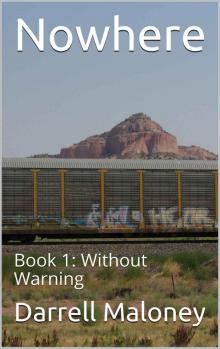 Without Warning
Without Warning Everything Has Changed
Everything Has Changed Rest in Peace
Rest in Peace This Changes Everything
This Changes Everything The Final Chapter
The Final Chapter It Can't Be Her
It Can't Be Her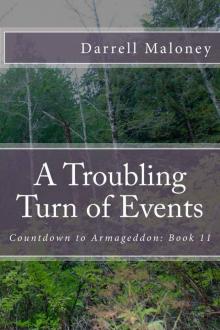 A Troubling Turn of Events
A Troubling Turn of Events The Blockade
The Blockade A Tearful Reunion
A Tearful Reunion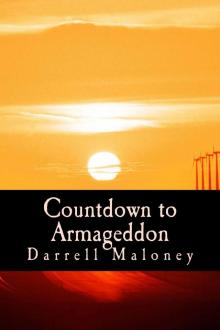 Countdown to Armageddon
Countdown to Armageddon Alone, Book 3: The Journey
Alone, Book 3: The Journey The Army Comes Calling
The Army Comes Calling The Grim Reaper Comes Calling
The Grim Reaper Comes Calling Her Name is Beth: Alone: Book 5
Her Name is Beth: Alone: Book 5 Red: The Adventure Begins
Red: The Adventure Begins Rise From The Ashes: The Rebirth of San Antonio (Countdown to Armageddon Book 3)
Rise From The Ashes: The Rebirth of San Antonio (Countdown to Armageddon Book 3) An Unkind Winter (Alone Book 2)
An Unkind Winter (Alone Book 2)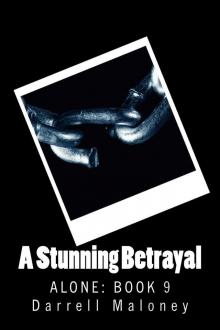 A Stunning Betrayal: Alone: Book 9
A Stunning Betrayal: Alone: Book 9 A Whole New World: Ranger: Book 2
A Whole New World: Ranger: Book 2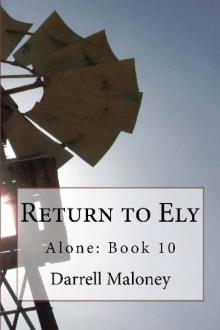 Return To Ely
Return To Ely A Lesson Learned: Red: Book 3
A Lesson Learned: Red: Book 3 The Homecoming: Countdown to Armageddon: Book 5
The Homecoming: Countdown to Armageddon: Book 5 Final Dawn: Book 12: Where Could He Be?
Final Dawn: Book 12: Where Could He Be? An Acquired Taste
An Acquired Taste On Desert Sands: Alone: Book 6
On Desert Sands: Alone: Book 6 The Battle: Alone: Book 4
The Battle: Alone: Book 4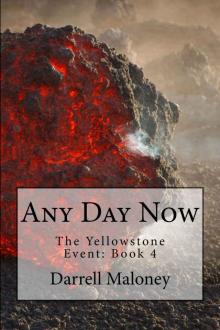 Any Day Now
Any Day Now Too Tough To Tame: Red: Book 2
Too Tough To Tame: Red: Book 2 No Help From Austin: Red: Book 5
No Help From Austin: Red: Book 5 An Unwelcome Homecoming
An Unwelcome Homecoming A New Start: Final Dawn: Book 9 (Volume 9)
A New Start: Final Dawn: Book 9 (Volume 9)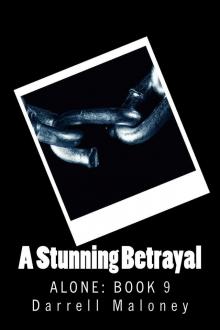 A Stunning Betrayal
A Stunning Betrayal An Undeclared War (Countdown to Armageddon Book 4)
An Undeclared War (Countdown to Armageddon Book 4) One of Our Own: Final Dawn: Book 11
One of Our Own: Final Dawn: Book 11 Texas Bound: Alone: Book 11
Texas Bound: Alone: Book 11 Payback: Alone: Book 7
Payback: Alone: Book 7 The Quest: Countdown to Armageddon: Book 6
The Quest: Countdown to Armageddon: Book 6 The Siege
The Siege The Yellowstone Event: Book 1: Fire in the Sky
The Yellowstone Event: Book 1: Fire in the Sky Return to Blanco (Red Book 4)
Return to Blanco (Red Book 4) The Search
The Search AFTER THE DUST SETTLED (Countdown to Armageddon Book 2)
AFTER THE DUST SETTLED (Countdown to Armageddon Book 2) Death Comes Calling (Ranger Book 3)
Death Comes Calling (Ranger Book 3) A Long Road Back: Final Dawn: Book 8
A Long Road Back: Final Dawn: Book 8